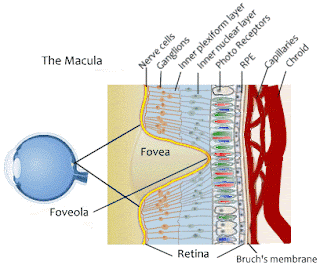Vitamins for Eye Health
What nourishments are useful for our visual perception? Large numbers of us attempt to eat the correct food sources to thin down and get into shape, yet our vision is significant as well. Does a carrot daily keep the optometrist away? Let’s get the straight info on vitamins for the eyes.
 |
| Fig:- Nutrients For Eye |
Carrots and nutrition for the eyes
You've probably heard that eating carrots improves our vision. In any case, is this simply a fantasy advised by guardians wherever to get their children to eat down more vegetables? Not exactly. Incidentally, Mom and Dad are right...mostly.
Vitamin A and vision make strong partners. Carrots contain heaps of beta carotene and Vitamin A, which can add to your eyes' wellbeing and may give an incredible wellspring of eye nutrients for macular degeneration and cataract.
 |
| Fig:- Retina |
Vitamin A and rhodopsin are additionally plentiful in carrots. Rhodopsin is a purple color that causes us find in low light circumstances. Without enough rhodopsin, we wouldn't have the option to see very well around evening time, even with a cloudless sky and splendid full moon.
So this makes one wonder: Could eating carrots morning, early afternoon and night give you phenomenal forces to see like an owl on the blackest evenings? Umm, no. While carrots offer numerous useful nutrients for your eyes, they won't transform you into a hero. (However, they can turn your skin marginally orange, on the off chance that you eat too much!)
In a fascinating turn, the legend of carrots and vision originates from World War II. Most food was hard to come by at that point—yet not carrots. The British Royal Air Force acknowledged eating carrots for an expanded capacity to see the adversary in obscurity. This gossip was put into action to propel more individuals to eat carrots. Today, this vision-related talk actually exists and, as we've seen, there is some reality—alongside some misrepresentation—to it.
Since you find out about carrots and our eyes, you may be pondering about different nutrients for your vision.
Other significant vision nutrients for great vision
In case you're similar to a great many people, you're wondering, "Do nutrients (vitamins) for vision work?" The basic answer is, as we've seen with Vitamin A in carrots, yes… yet in varying degrees. There are nutrients (vitamin) for vision loss that you can take, yet none of them produce wonderful outcomes.
 |
| Fig:- Eye Nutrients |
Getting enough nutrients is significant at each age, particularly regular nutrients in your food. The elements of nutrients can be various. Their advantages are obvious. To help you, we've chosen to list different nutrients, their advantages to your eyes, and what nourishments give them plentifully.
Vitamin C for eyes
You can discover it in natural products like oranges, kiwi, and strawberries, just as vegetables like broccoli, mustard greens, and peppers. Notwithstanding giving cell reinforcements, it can likewise help slow cataract and give required eye nutrients for macular degeneration.
 |
| Fig:- Vitamin C Rich sources |
Vitamin E for eye health
Vitamin E may fill in as an incredible cell reinforcement and specialist against cataract and macular degeneration too. You can discover Vitamin E in numerous nuts, similar to almonds, peanuts, and pine nuts, alongside dried apricots and sunflower seeds.
 |
| Fig:- Vitamin E Rich Sources |
Lutein for aging eyes
Lutein is a supplement found in kale, spinach, and turnip greens. It's likewise found in our retinas, so it's a significant part of healthy vision.
 |
| Fig:- Lutein and Zeaxanthin Rich Sources |
Eating carotenoids like lutein and zeaxanthin (indeed, that is a significant piece!) furnish you with extraordinary cell reinforcements and may help against age-related vision issues, for example, cataract and macular degeneration.
Nothing in this article is to be interpreted as clinical counsel, nor is it proposed to supplant the suggestions of a clinical expert. For explicit inquiries, if it's not too much trouble, see your eye care professional.





1 Comments
BSc Optometry Colleges in Hyderabad
ReplyDelete